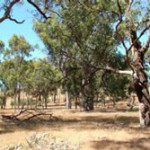Michael Roche, Executive Director of the Queensland Resources Council pointed out on ABC RN Breakfast this morning the problems with open cut coal mines on floodplains, namely the sedimentary basins on the east coast of Australia, as all the voids are left open after mining ceases. Floodwaters end up in the pit, and become highly saline. The sedimentary basins also represent by far the majority of the best farmlands on the East Coast. Recent heavy rain in the Central West of NSW including road closures is a case in point, where coal miners have no choice other than to pump it out into the creeks and rivers. High nutrient levels in rivers causes eutrophication, growth of cyanobacteria (blue-green algae), and the excessive growth of plant life, thus reducing the available oxygen available for other life including fish.

